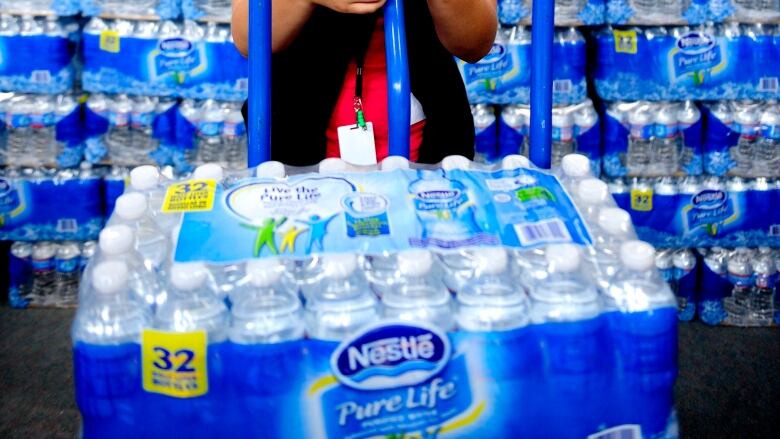Nestl says Middlebrook well for 'future business' and Aberfoyle backup

A small but fast growing Ontario community looking for a safe drinking water supply has been outbid in its attempt to buy a well by multinational giantNestl, which acquired the site toensure "future business growth."
Nestl, which can already take up to 3.6 million litres of water a day for bottling at its site in nearbyAberfoyle, Ont., bought the well fromMiddlebrookWater Company last month after having made aconditional offer in 2015.
- Township of Centre Wellington tried to buy Elora well now owned by Nestl
- Nestl purchases Elora property ahead of pump test approvals
A spokesman forNestlsaid the company had "no idea" the other bidder for the five-hectare site was the Township of Centre Wellington, but it waived all conditions and matched the competingoffer so it could complete the purchase.
Nestlsaid theMiddlebrooksite will be a "supplemental well for future business growth" and a backup for its plant inAberfoyle.
Township Mayor KellyLintonsaidNestldropped its conditions, including a pump test to determine if the well met its quality and quantity requirements, after it learned ofthecompeting bid.WellingonCentrelwanted to purchase the well to keep its water supply "safe from commercial water taking" long into the future, addedLinton.
"When water taking is solely within the jurisdiction of the Ministry of the Environment and Climate Change, the only role we really have as a municipality is to comment to the ministry, and itissues all the permits," he said. "So purchasing the well would automatically give us control, and that's what we were looking for, control of our water source and not just the ability to comment."
The mayor wouldn't disclose the dollar value of the municipality's bid, but said it had no conditions attached.
The Ministry of the Environment, which has not yet ruled onNestl'sapplication for a pump test, called the sale of theMiddlebrookproperty a "private transaction," and said its onlyrole was to evaluate the proposed water-permit application.
In the meantime,Nestlis allowed to keep taking water from its well inAberfoylewhile the ministry reviews the company's application to renew its water-taking permit, which expired in July.
Water-taking permits became a hot-button issue after The Canadian Press reported last month that the province charges $3.71 for every million litres of water.
Ontario review
British Columbia instituted a charge of $2.25 per million litres in 2015 after giving it away for decades, while Quebec, the other province with major bottled water operations, charges $70 permillion litres.
In Ontario, the permits allow municipalities, mining companies and golf courses -- in addition to the water-bottling companies -- to take a total of 1.4 trillion litres out of the surface and groundwater supplies every day.
Responding to public criticism over the use of water resources in the province, which was hit by a severe drought this summer, Premier Kathleen Wynne called some of the conditions for the permits,including the fee, outdated. She told Environment Minister Glen Murray to review the rules for bottled water companies.
The Council of Canadians, a non-profit social action organization, said the Grand River watershed, where Nestle's well and bottling plant are located, is a fragile ecosystem feeding intoLake Erie that must be protected.
"The Nestle well near Elora sits on the traditional territory of the Six Nations of the Grand River, 11,000 of whom do not have access to clean running water," said council chair Maude Barlow.
According to Health Canada, about 2,000 people in Six Nations are hooked up to the community water system, but "many residents use cisterns for drinking water and receive deliveries from provinciallyregulated, off-reserve water providers."
Pushback
Local activists and international environmental groups are pushing the province to reject Nestle'sAberfoylerenewal application.
Ontario's former environmental commissioner warned in a 2012 report called "Water-Taking: Leave Something for the Fish," that the province wasn't even recovering the cost of its water qualityprograms, and said full-cost water pricing would be a "powerful catalyst for water conservation."
Nestle, which has 2,500 employees in Ontario, 300 at Nestle Waters Canada, said it was prepared to pay more if rates were increased, but only if all companies with water-taking permits facethe higher fees.
"We fully agree that all groundwater users should pay their fair share to fund the management of our water resources and all users must be treated equitably," the company said in an emailedstatement.
Barlow, of the Council of Canadians, argues that there is no need for a bottled water industry in Canada because tap water for virtually everyone except First Nations is perfectly safe andtested daily.
"Allowing a transnational corporation to continue to mine this water is a travesty, especially given that most local people can get clean, safe and affordable water from their taps," she said.












_(720p).jpg)


 OFFICIAL HD MUSIC VIDEO.jpg)
.jpg)



























































































